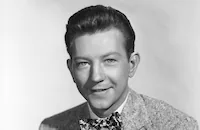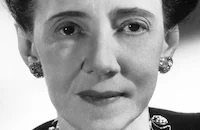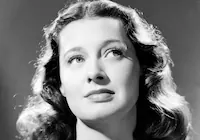Sing You Sinners

Brief Synopsis
Cast & Crew
Wesley Ruggles
Bing Crosby
Fred Macmurray
Donald O'connor
Elizabeth Patterson
Ellen Drew
Film Details
Technical Specs

Synopsis
David Beebe repeatedly postpones his marriage to Martha Randall because his brother Joe is unemployed and cannot support the rest of the Beebe family--Mother Beebe and their little brother Mike. After Joe loses his new job at the local gas station for trading gas for rummage articles, he travels to California, wins money at the racetrack, uses the money to purchase a swap shop, and then trades the store for racehorse "Uncle Gus." Joe sends news of his success back home, and Mother and Mike travel out to stay with him. David and Martha later travel to California only to discover the rest of their family living on the brink of poverty because of Joe's laziness. David again puts off his wedding and sends Martha back home. Mother forces her sons to use their musical training and work as a singing trio at a nightclub to earn their keep. Young Mike, meanwhile, is scheduled to ride a big race as the jockey for Uncle Gus, and is bribed into losing the race by competitor Harry Ringmer. When Mike tells Joe about his arrangement with Ringmer, Joe reassures him and advises him to race to win. Mike wins the race, and Ringmer beats up both him and Joe. David and Mother come to their rescue, and the fight continues until Ringmer and his thug give up. Now with enough money to pay their debts, David announces he is quitting singing, but Mother insists that they all keep steady jobs or she will leave the family. Her sons agree to her demand, and David sends Martha a telegram asking her back to "marry the four of them." In the end, Martha and Mother watch as the boys perform.

Director

Wesley Ruggles
Cast

Bing Crosby

Fred Macmurray

Donald O'connor

Elizabeth Patterson

Ellen Drew

John Gallaudet
William Haade
Paul White

Irving Bacon
Tom Dugan
Herbert Corthell
Harry Barris
Herbert Heywood
Harlan Briggs
Hayden Stevenson
Duke York
James Adamson
Chester Clute
Dell Henderson
Heinie Conklin
June Gittelson
Billy Newell
Billy Dooley
Joe Hernandez
Gwen Kenyon
Ruth Rogers
Joyce Mathews
Ethel Clayton
Gloria Williams
Paula De Cardo
Norah Gale
Barbara Salisbury
Dorothy White
Marie Burton
Sheila Darcy
Yvonne Duval

Laurie Lane
Helaine Moler
Carol Parker
Mary Parker
Louise Seidel
Blanca Vischer
Janet Waldo
Cheryl Walker
Marion Weldon
Ligaroti, A Horse
Crew
Claude Binyon
John Burke
Hoagy Carmichael
Hans Dreier
Ernst Fegté
A. E. Freudeman
Earl Hayman
Arthur Jacobson
Don Johnson
Frank Loesser
Alma Ruth Macrorie
James V. Monaco
Boris Morros
Wesley Ruggles
Wesley Ruggles
Karl Struss
Max Terr
Paul Weatherwax
Adolph Zukor

Photo Collections
Videos
Movie Clip



Film Details
Technical Specs

Articles
Sing, You Sinners
The original title of the film was The Unholy Beebes , which Crosby liked, but the studio didn't; they thought the audience wouldn't be able to pronounce Beebe, and changed it to Harmony for Three before settling on Sing You Sinners . The casting changed as well. Fox star Don Ameche and MGM's Mickey Rooney were booked to play Crosby's brothers before Ameche dropped out. Rooney was attached to the project up until just before shooting started in April 1938, but MGM suddenly took him off the picture, leaving the producers without a kid brother for Bing. It was Paramount executive Artie Jacobson who was tasked with coming up with a replacement, fast. He found O'Connor performing at a benefit for the Motion Picture Relief Fund (now the Motion Picture and TV Fund) and signed him. For MacMurray's girlfriend, Jacobson suggested Terry Ray, who had appeared in a bit part in Crosby's Rhythm on the Range (1936). Jacobson wanted to take Ray to meet Crosby to see if she met with his approval, but Bing, who was known for his casual attitude on set, was unconcerned, telling Jacobson that if Ruggles was okay with her, then he was, too. For fun, Jacobson asked Crosby to be the one to let Ray know that she had the job because he wanted Bing to see how excited she would be. When Ray was brought to the set and told the news, she fainted dead away. Before the film was released, Terry Ray had her name changed to Ellen Drew, which was the last of several names that the studio tried out. Crosby said that he got so confused by this that he called her Ellen Terry, after the famous 1800s stage actress.
Crosby had been cast as the romantic leading man in all of his pictures to date, and was apparently tired of it, saying in an official Paramount press release that he was happy that Fred MacMurray got the girl instead of him. He claimed that he'd made enough love scenes over the past few years "And I haven't got one in Sing, You Sinners . Whoopee! What a break!" Crosby caught a break with the music for the film - he sung two songs that would become classics: Small Fry , written by Hoagy Carmichael and Frank Loesser, and I've Got a Pocketful of Dreams , by James Burke and James V. Monaco.
Sing, You Sinners was a happy time for Crosby, as the film was shot on location at the Pomona Fairgrounds and Santa Anita racetrack in Arcadia, north east of Los Angeles. Crosby celebrated his 35th birthday during production on May 2nd, although the studio clung to the fiction that he was 34.
When Sing, You Sinners opened at the Paramount Theater in New York City on August 17, 1938, it was well received by the critics. Life magazine wrote that Joe Beebe was a good role for Bing because he "abandons the romantic roles that his stocky figure makes him unsuited and takes a comfortable, happy-go-lucky part that fits him like a glove." The Prescott Evening Courier praised "outstanding performances turned in by two of the screen's newest star discoveries, Ellen Drew and Donald O'Connor. [...] Miss Drew exhibits a freshness and sincerity which should certainly carry her to the top of the ladder in Hollywood. O'Connor, who plays Bing's younger brother and jockey, coming to the screen after years on the vaudeville stage, can act, sing, play an accordion, and ride a racehorse with equal ability." O'Connor's performance in Sing, You Sinners led to a contract with Paramount and a film career that lasted sixty years.
By Lorraine LoBianco
SOURCES:
"Bing Crosby Portrays Serious Role in 'Sing, You Sinners'" Spokane Daily Chronicle 7 Oct 38
Giddins, Gary Bing Crosby: A Pocketful of Dreams: The Early Years 1903-1940
The Internet Movie Database
Reed, John Howard More Movie Musicals
Paris, James Robert ad Pitts, Michael R. Hollywood Songsters: Garland to O'Connor
"Sing, You Sinners: Bing Crosby Croons and Fights" Life 5 Sept 38

Sing, You Sinners
Ellen Drew, 1914-2003
She was born Esther Loretta "Terry" Ray on November 23, 1914, in Kansas City, Missouri. The daughter of a barber, her family moved to Chicago when she was still an infant and she lived a very quiet childhood far removed from the glamour of Hollywood. She was encouraged by some friends to enter a beauty contest when she was just 17. After winning, she tried her luck in Hollywood, but found that they were no immediate offers for her particular talents.
She eventually took a waitressing job at C.C. Brown's, a famed Hollywood Boulevard soda fountain, and had virtually abandoned her dreams as a starlet when William Demarest, a popular actor's agent and well-known character actor, spotted her. Demarest arranged a screen test for her at Paramount, and she was promptly placed under contract for $50 a week.
For the first few years, (1936-38), Drew got only bit parts, and was often uncredited. When she finally got prominent billing in the Bing Crosby musical Sing You Sinners (1938), she decided to change her name, from Terry Ray to Ellen Drew. She earned her first major role in Frank Lloyd's If I Were King (1938) opposite Ronald Colman, yet for the most part of her career, rarely rose above "B" material and second leads. Still, she had some fine exceptions: Preston Sturges' enchanting comedy Christmas in July (1940), with Dick Powell; Tay Garnett's lighthearted war romp My Favorite Spy (1942) co-starring Kay Kyser; Julien Duvivier's taut The Imposter (1944), holding her own with a brooding Jean Gabin; and Mark Robson's chilling low-budget chiller Isle of the Dead (1945) opposite Boris Karloff. Drew made some notable television appearances in the late '50s including Perry Mason and The Barbara Stanwyck Show, before retiring from the entertainment industry. She is survived by her son David; five grandchildren; and five great-grandchildren.
by Michael T. Toole
Ellen Drew, 1914-2003
Donald O'Connor, 1925-2003
Born Donald David Dixon O' Connor in Chicago on August 28, 1925, he was raised in an atmosphere of show business. His parents were circus trapeze artists and later vaudeville entertainers, and as soon as young Donald was old enough to walk, he was performing in a variety of dance and stunt routines all across the country. Discovered by a film scout at age 11, he made his film debut with two of his brothers in Melody for Two (1937), and was singled out for a contract by Paramount Pictures. He co-starred with Bing Crosby and Fred MacMurray in Sing, You Sinners (1938) and played juvenile roles in several films, including Huckleberry Finn in Tom Sawyer - Detective (1938) and the title character as a child in Beau Geste (1939).
As O'Connor grew into adolescence, he fared pretty well as a youthful hoofer, dancing up a storm in a string of low-budget, but engaging musicals for Universal Studios (often teamed with the equally vigorous Peggy Ryan) during World War II. Titles like What's Cookin', Get Hep to Love (both 1942), Chip Off the Old Block and Strictly in the Groove (both 1943) made for some fairly innocuous entertainment, but they went a long way in displaying O'Connor's athletic dancing and boyish charm. As an adult, O'Connor struck paydirt again when he starred opposite a talking mule (with a voice supplied by Chill Wills) in the enormously popular Francis (1949). The story about an Army private who discovers that only he can communicate with a talking army mule, proved to be a very profitable hit with kids, and Universal went on to star him in several sequels.
Yet if O'Connor had to stake his claim to cinematic greatness, it would unquestionably be his daringly acrobatic, brazenly funny turn as Cosmo Brown, Gene Kelly's sidekick in the brilliant Singin' in the Rain (1952). Although his self-choreographed routine of "Make "Em Laugh" (which includes a mind-bending series of backflips off the walls) is often singled out as the highlight, in truth, his whole performance is one of the highlights of the film. His deft comic delivery of one-liners, crazy facial expressions (just watch him lampoon the diction teacher in the glorious "Moses Supposes" bit) and exhilarating dance moves (the opening "Fit As a Fiddle" number with Kelly to name just one) throughout the film are just sheer film treats in any critic's book.
After the success of Singin' in the Rain, O'Connor proved that he had enough charisma to command his first starring vehicle, opposite Debbie Reynolds, in the cute musical I Love Melvin (1953). He also found good parts in Call Me Madam (1953), There's No Business Like Show Business (1954), and Anything Goes (1956). Unfortunately, his one attempt at a strong dramatic role, the lead in the weak biopic The Buster Keaton Story (1957) proved to be misstep, and he was panned by the critics.
By the '60s, the popularity of musicals had faded, and O'Connor spent the next several years supporting himself with many dinner theater and nightclub appearances; but just when it looked like we wouldn't see O'Connor's talent shine again on the small or big screen, he found himself in demand at the dawn of the '90s in a string of TV appearances: Murder She Wrote, Tales From the Crypt, Fraser, The Nanny; and movies: Robin Williams' toy-manufacturer father in Toys (1992), a fellow passenger in the Lemmon-Matthau comedy, Out to Sea (1997), that were as welcoming as they were heartening. Survivors include his wife, Gloria; four children, Alicia, Donna, Fred and Kevin; and four grandchildren.
by Michael T. Toole
Donald O'Connor, 1925-2003
Quotes
Trivia
Notes
The working title of this film was The Unholy Beebes. According to a Hollywood Reporter news item, Don Ameche and Mickey Rooney were initially cast in the film, however, Ameche was replaced by Fred MacMurray, and Rooney was replaced by Donald O'Connor. Contemporary and modern reviewers alike note the film's importance in Bing Crosby's career as his dramatic role was a departure from earlier roles and demonstrated a broader acting range. The film was previewed at Del March racetrack, where Crosby often raced his own horses. According to the pressbook, Crosby's horse "Ligaroti" appears in the film as the winning horse in the sweepstakes. The pressbook also notes that the racetrack scenes were shot on location at Santa Anita racetrack in Arcadia, CA. Sing You Sinners was considered one of the best English-language films of 1938 by the National Board of Review Awards. Paramount remade Sing You Sinners in 1944 as And the Angels Sing, directed by George Marshall and starring Dorothy Lamour and Fred MacMurray (see AFI Catalog of Feature Films, 1941-50.) Although Sing You Sinners is a film about three singing brothers and their mother, And the Angels Sing features three singing sisters and their father.














